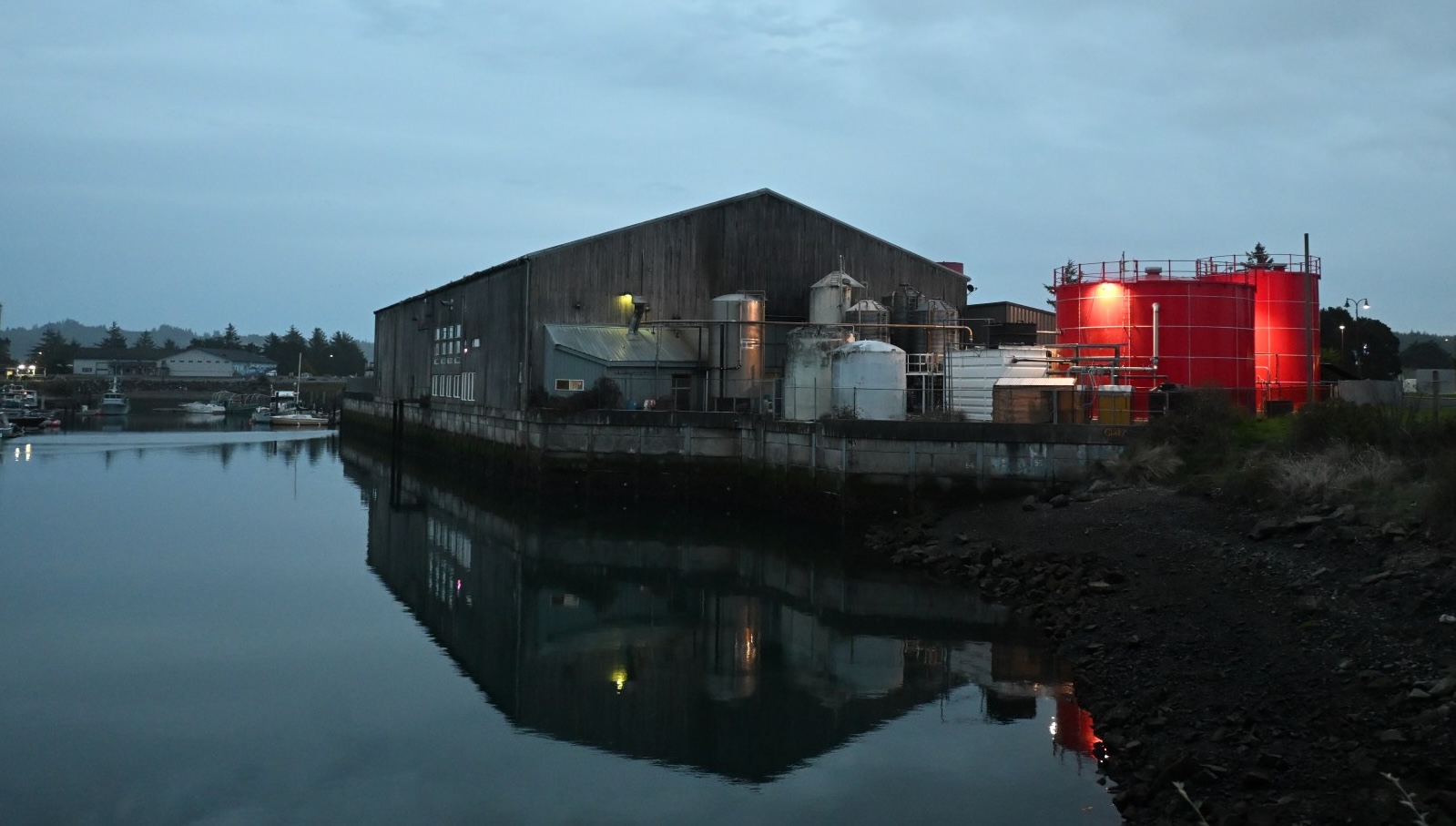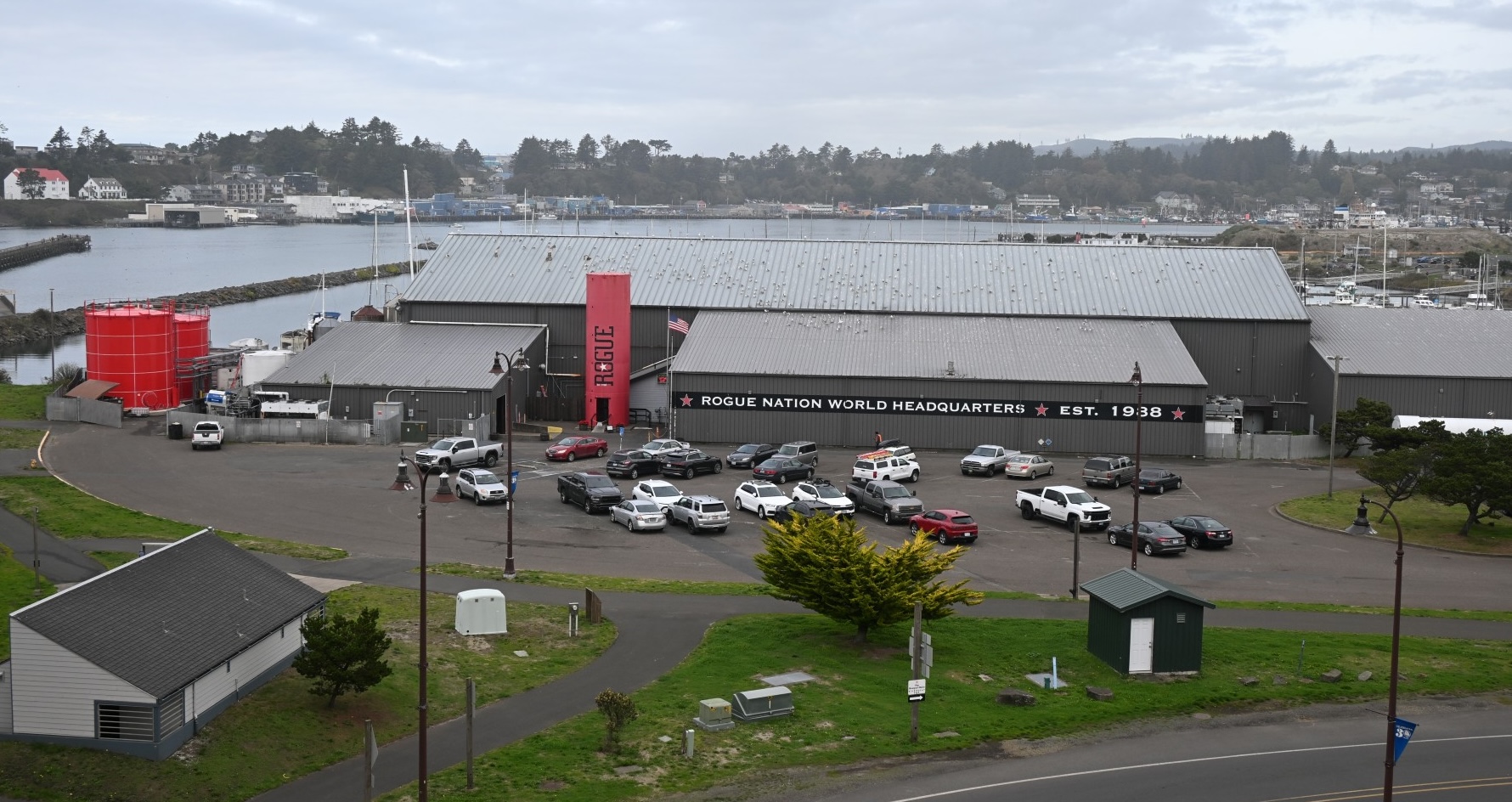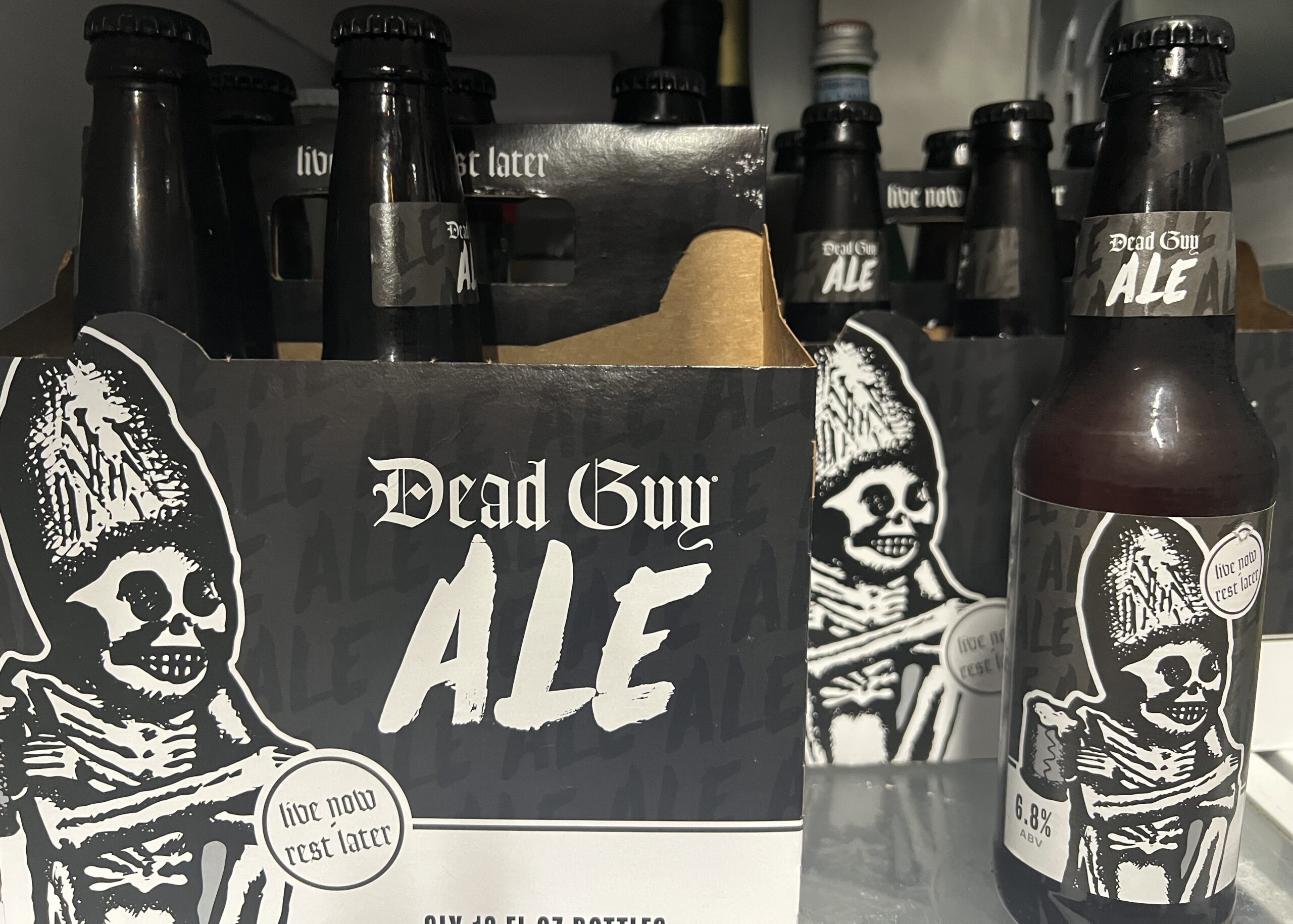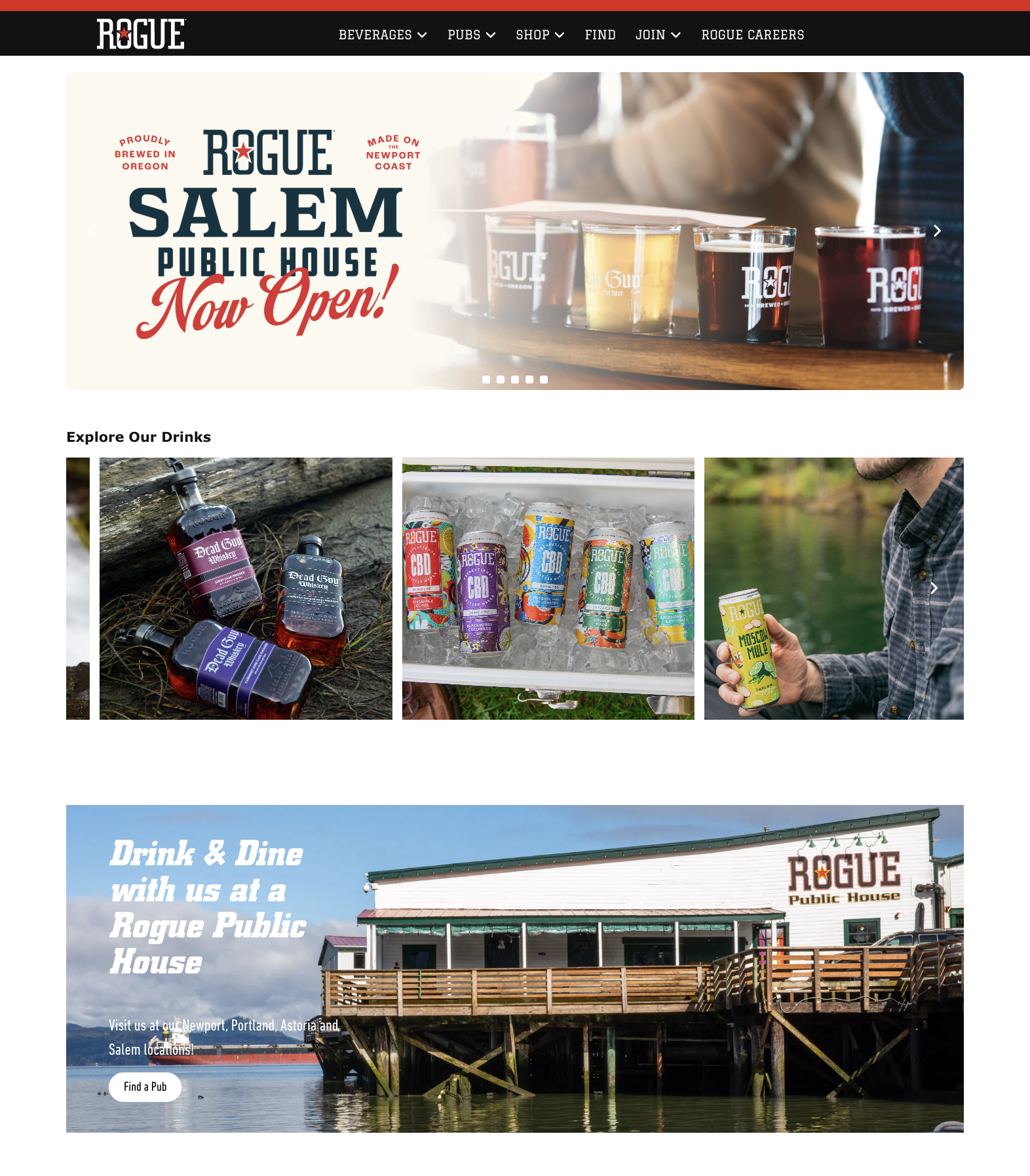
By DANA TIMS and SHAYLA ESCUDERO/Lincoln Chronicle
The postmortem on Rogue Ales & Spirits, one of Oregon’s biggest and best-known craft brewers that abruptly closed its sprawling Newport operations and all of its restaurants last week, has yet to be written.
Still unknown are the business reasons explaining how a company that established an international reputation for its plethora of products and is still listed among the country’s top 50 craft breweries and Oregon’s third largest, ended up owing more than $1.4 million in unpaid rent and back taxes and closed its doors without notice.

“It’s still shocking to me and it boggles my mind,” said Jeff Alworth, whose Beervana blog has covered Oregon beer and brewing since 2006. “We’ve all heard about small breweries deeply in debt having to move things from credit card to credit card. But with Rogue Ales? I can’t even guess what was going on there.”
There are plenty of theories and speculation, to be sure. But what Alworth and other industry watchers are also remembering is the creative marketing and brewing innovations that helped Rogue Ales plant a flag in the marketplace for the many Oregon breweries that followed in its 40-year wake.
“They were distinct because they did things that a brewer’s brewer would say is the right way,” Alworth told the Lincoln Chronicle. “They owned their own brewery. They hired a head brewer who was professionally trained. And they established Oregon as an amazing place to make great beer.”

No public explanation
Rogue still has not made a public announcement about what caused the sudden closure last Friday of all its operations, including pubs on the Newport bayfront, Salem, Astoria and Portland. Its website is up and running although people who try to order beer online get a “sold out” notice.
Rogue executives met with Port of Newport officials that morning to notify them the company was ceasing operations. Rogue’s nearly 60 employees in Newport were notified the same day.
Jeff Schultz of Portland, one of the original founders of Rogue, said that the company’s board found there was no “path forward to meaningful profitability,” according to an email exchange the Chronicle obtained.
“… we decided that it was in the best interest of our employees, creditors and shareholders to shut down now with the resources that we have to maximize our ability to pay our stakeholders,” Schultz wrote. “I am one of the two surviving co-founders of the company, so I report this with a heavy heart.”
But one thing is known, the company piled up a lot of debt around Newport.

Rogue owes the Port of Newport $545,000 in rent, which is less than a year’s worth. Since December 2024, their payments have been scattered, Port executive director Paula Miranda told the Chronicle.
“We were working with them on a payment plan when they finally notified us that they were shutting down,” she said.
Rogue’s biggest known outstanding debt is to Lincoln County for more than $918,000 in unpaid property taxes, according to records examined by the Chronicle. The majority of its nine accounts have been delinquent for four years.
Currently, none of Rogue’s accounts are in the foreclosure process. Accounts with four years of unpaid taxes begin the foreclosure process after a delinquent notice is given in May. According to Lincoln County, the foreclosure process usually takes 6-7 years before the county would seize the property’s deed.
The Port has closed off Rogue’s main headquarters and is only allowing three employees to access the building and the Port is still accessing what the sudden closure means financially for it, Miranda said.
Following an executive (closed) session Tuesday, the Port’s board approved another tenant, a marine electronics company, for the vacant distillery building which will be shared with a fish processor. No tenants have been identified yet to take over the main 47,000 square foot building and Rogue’s barrel-making facility is empty.
An information session for the Newport employees who were abruptly laid off is 1-3 p.m. Friday at WorkSource Oregon Centers in Newport, Seaside and online. WorkSource Oregon said Rogue’s attorneys confirmed that all affected employees will receive all wages and benefits to owed them.

Beer innovators
Alworth, in his blog, made a point of noting that Rogue, which may perhaps seem stodgy and out of date to today’s beer aficionados, came in red hot when it burst upon Oregon’s beer scene in 1988. It revolutionized the market by making beers such as Shakespeare, an early oatmeal stout, and Old Crustacean Barleywine, which Alworth called “impossibly hoppy.”
The company’s first brewmaster, John Maier – stunningly, one of only two professional brewers who served in that role during Rogue’s entire 37-year run – bore the nickname of “More Hops.”
Maier personally donated nine hairs of his trademark full beard some years later to help create Rogue Beard Beer. It was an outgrowth, so to speak, of the company’s desire at the time to gather wild yeast to complement its locally sourced hops.
Rogue was “making beer that no one recognized,” Alworth wrote in one blog post. “It was a brewery for the adventuresome.”
Tom Gauntt, a long-time Oregon beer historian who is writing a book detailing the trade’s early years and rise to prominence, is another who was taken aback by Rogue’s shutdown.

“I certainly didn’t see it coming,” Gauntt said. “Outside of their own circle, I don’t think anybody did.”
Among the memories jarred loose by the sudden closure was one Gauntt had of sitting in what he called a “swanky bar” in New York City in 2005. He was admiring the place’s many eye-catching features when he spotted a display for Rogue’s Dead Guy Ale, its distinctive skeletal figure, clutching a glass of brew, hunched low on its bony haunches.
“I thought, ‘Boy, you don’t see Oregon products in a market like this all the time’,” Gauntt said. “It was one of the first indications that Oregon beers had found a place among national competition.”
Much of that was due to the elemental nature of the business itself, Gauntt said, noting that three of Rogue’s founders were among Nike’s first employees. Those were Jack Joyce, Rob Strasser and Bob Woodell. Schultz was Woodell’s accountant and an avid home brewer and had approached the other three with an idea to open a brewpub.
Strasser, in particular, was known as a hard-charging executive who, when asked about Nike’s essential nature, replied, “We’re a marketing company.”
“And that’s a lot of what Rogue brought to the table,” Gauntt said. “These weren’t just guys who said, ‘Hey, we like beer. Wouldn’t it be a lot of fun to make it?’ They were highly capitalized business people who had a very good marketing sense and were a touch above those who simply said, ‘The beer will sell itself’.”
Innovation became the company’s watchword.
Rogue Ales was the first, for instance, to begin growing its own hops on a 42-acre property near Independence. Rogue was the first brewery to export to Japan, which still maintains an affinity for Oregon’s craft beer. And they were among the first to diversify by investing significant sums in spirits and dipping their toes into the state’s fledgling cider industry.
Beer, however, remained the company’s focus, with its capitalization allowing it to maintain production capacities that smaller operations invariably struggled to achieve.
“In those early days of the 1980s and ’90 brewers created more demand for their beer than they could deliver,” Gauntt said. “If anything achieved any level of popularity, they simply couldn’t fill more orders. Rogue didn’t have that problem, and it made a huge difference for them in the marketplace.”

When beer goes flat
But in the end? Gauntt and others wonder if the company’s gargantuan size might have come back to bite it. Rogue’s website bragged of its placement in all 50 states and at least 50 countries.
“They were spread around enough,” he said, “that they probably had a capacity crisis of their own at some point.”
There are a number of other possible factors that crimped the company’s ability to operate, said Lisa Allen, owner and head brewer at Heater Allen Brewing in McMinnville.

“They were known for innovation and an ability to go out and get their beer into so many different markets,” said Allen, who also serves as vice president of the Oregon Brewers Guild. “But we’ve seen significant cost increases in critical areas such as ingredients, utilities, supplies and distribution.”
She added, “I don’t know the specifics about why Rogue closed, but those costs would certainly have impacted them, as well as everyone else.”
It’s also true that breweries, across the board, have not come close to recovering from sales levels from before the pandemic, she said. And a general raft of medical advisories telling consumers that drinking even some alcohol probably hasn’t helped.
“But at this point, right now, it’s important to remember that Rogue helped so many who came behind because of their vision and creativity,” Allen said. “They went out and got their brand known, not just in this state, but internationally. And for that, all of us owe them an awful lot.”
- Dana Tims is an Oregon freelance writer who contributes regularly to Lincoln Chronicle and can be reached at DanaTims24@gmail.com
- Shayla Escudero covers Lincoln County government, education, Newport, housing and social services for Lincoln Chronicle and can be reached at Shayla@LincolnChronicle.org



















